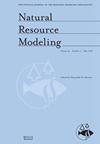Optimal spatial management in a multiuse marine habitat: Balancing fisheries and tourism
IF 2.1
4区 环境科学与生态学
Q3 ENVIRONMENTAL SCIENCES
引用次数: 3
Abstract
Marine fisheries are an important source of food supply and play an important economic role in many regions worldwide. However, due to aggressive fishing practices they are increasingly overexploited. Marine reserves have the potential to alleviate this problem and moreover, they also provide a physical area where an alternative economic activity can exist without being in conflict with fishing gear. Here we explore the idea of combining multiple economic activities in a marine ecosystem, namely: fishing and tourism. We use a model in which the fish population evolves according to a reaction‐diffusion partial differential equation, and we consider the interactions between fishing and tourism. We use optimal control theory to find, depending on the model parameters, the optimal management strategy. The results show that, subject to certain conditions, it is possible to have two different revenue streams in the same habitat in contrast with the classical view of competing uses. We also corroborate that marine reserves emerge as the optimal strategy and that the presence of visitors in these areas generates larger profits than if only fishing was considered.多用途海洋栖息地的最佳空间管理:平衡渔业和旅游业
海洋渔业是粮食供应的重要来源,在全球许多地区发挥着重要的经济作用。然而,由于侵略性的捕鱼行为,它们越来越被过度开发。海洋保护区有可能缓解这一问题,此外,它们还提供了一个可以存在另一种经济活动而不与渔具冲突的物理区域。在这里,我们探讨了在海洋生态系统中结合多种经济活动的想法,即:渔业和旅游业。我们使用了一个模型,其中鱼类种群根据反应-扩散偏微分方程进化,我们考虑了渔业和旅游业之间的相互作用。我们利用最优控制理论,根据模型参数找到最优管理策略。结果表明,在一定条件下,同一生境可能有两种不同的收入来源,这与传统的竞争用途观点不同。我们还证实,海洋保护区是最理想的策略,游客在这些地区的存在比只考虑捕鱼产生更大的利润。
本文章由计算机程序翻译,如有差异,请以英文原文为准。
求助全文
约1分钟内获得全文
求助全文
来源期刊

Natural Resource Modeling
环境科学-环境科学
CiteScore
3.50
自引率
6.20%
发文量
28
审稿时长
>36 weeks
期刊介绍:
Natural Resource Modeling is an international journal devoted to mathematical modeling of natural resource systems. It reflects the conceptual and methodological core that is common to model building throughout disciplines including such fields as forestry, fisheries, economics and ecology. This core draws upon the analytical and methodological apparatus of mathematics, statistics, and scientific computing.
 求助内容:
求助内容: 应助结果提醒方式:
应助结果提醒方式:


